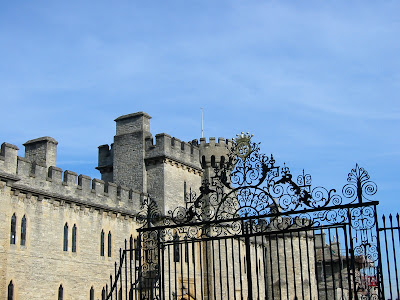
... England, and St. George!" Shakespeare's blood-summoning rallying-cry from his famous depiction of the start of the Battle of Agincourt comes to mind as we hear about our present-day Harry warrioring over there in Afghanistan. To judge from television interviews, he seems like a very decent young man in search of not only of adventure, but also some measure of independence, some sense of himself independent of the heritage of his birth. It must be a weight to have to carry around, along with all the exposure to the public that goes along with it.
I have not explored the political blogs, but I imagine there must be considerable backlash against The Drudge Report for outing Harry. It seems like an ungallant thing to have done, when the young man himself was exhibiting a gallantry of his own. Clearly, the revelation has put both him and his comrades at risk, setting him up as a juicy target for the Taliban, and this morning I hear that he will likely be withdrawn from the fighting lines at the front. More's the pity, if only in the sense that his presence there put the families of our American rich and powerful to shame. There are many things that I have admired about John McCain, and one of them is that he stands apart from virtually every other member of Congress in this respect, allowing his own family to stand in harm's way, as he himself did in his younger years.
(That said, let me quickly add that I oppose everything McCain proposes in the way of policies for the future; and that I note, sadly, that he has turned away from his purported principles on many important issues--even torture.)
Back to Harry and Afghanistan. Obama's right. It's here that the "war on terrorism" should have been pursued from its earliest days. The reported resurgence of the Taliban and its Al Qaeda allies is a frightening reminder that we are very far from winning what, as it's currently conceived, is an unwinnable war. I heard on at least one report that they have regained a full one-tenth of the territory which they once ruled--thanks to our intervention in their struggle with the Soviet Union--with ruthless barbarity and medieval religious fervor.
And once again, I find myself in a distressing moral landscape. I despise war and violence, I despise the imposition of one person's will upon another, one country's will upon another; and yet when I see oppression of the kind once exercised by the Taliban against their own people, when I see the threat of ethnic cleansing and genocide, I find myself unable to embrace the full meaning of pacifism. I have to concede in such cases that armed intervention can become the desirable option.
As a recovering Brit, I take note of some silly remnant of national pride in that our prince Hal is fighting the right war. Even though I can't believe that "God" is for anyone, even Harry, England, and St. George, something in me admires the warrior in him. I could wish his warriorship might be manifest in actions other than the old-world, violent kind; but along with many others, I suspect, I am frankly pissed at Drudge for interposing what I judge to be his own self-importance into matters more weighty than his trivial report.
Slightly confused Metta to all this Friday! May we all find true happiness and peace in our lives.

























































